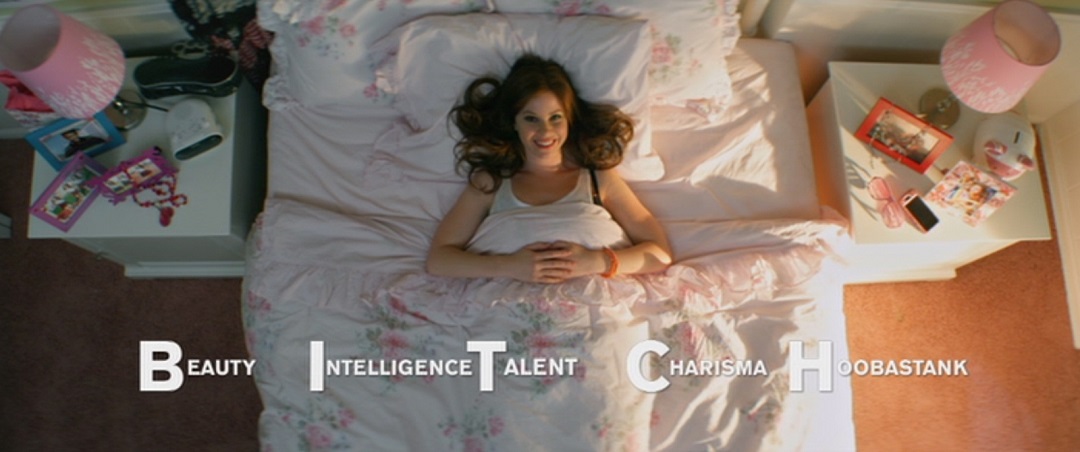You Have to See… is a weekly feature here at 4:3, where one staff writer picks a film they love and makes a group of other writers watch it for the first time. Once this group has seen the film, the suggestor writes a piece advocating the film and the others respond below. Whilst not explicitly spoiling the film, the article is detailed. We would recommend seeking out and watching the film each week, then joining in the debate in the comments section.
This week Felix Hubble looks at Joseph Kahn’s 2012 feature, the critically maligned Detention.
Every six or so weeks I plan to introduce a group of our writers to films which I consider future cult classics: fascinating B movies and genre flicks that the more refined (and, dare I say, pretentious) film aficionados among us have probably glossed over or missed out on. The first of these essays is going to focus on Joseph Kahn’s second feature, 2012’s Detention, one of the most energetic, frenetic and downright insane films I’ve ever had the pleasure of watching. The film’s synopsis (which does it little justice) states that the film is about “a killer named Cinderhella [who] stalks the student body at the high school in Grizzly Lake [and the] group of co-eds [who] band together to survive while they’re all serving detention.” This is kind of an aspect of the film, a loose (loose) plot line that holds everything together (despite kicking in around an hour into the feature) but, as I am about to argue, Detention has so much more to offer than this intentionally basic premise, one that underscores (in one way or another) basically every teen slasher movie of the mid-90s to late-00s. How many of those films can boast time-travelling bear statues, fly-infused mutant teenagers, shredded temporality that operates across multiple timelines, dialogue that doesn’t feel dated and, on an extremely basic level, gags that are actually consistently funny?
Kahn’s Detention simultaneously conforms to the tropes and structure of traditional teen slashers while subverting and parodying all of its predecessors (of both the serious – Scream, Mean Girls, Clueless – and the spoofy – Scary Movie, Not Another Teen Movie – kind), quite an impressive feat considering that on a surface level it seems to purely conform to their common, genre-dictated specifications. Unlike the endless stream of Scary Movie sequels and associated knock-offs, Detention is a film that won’t alienate a younger audience that lacks the knowledge of the films it parodies. No direct knowledge of its targets are required for the jokes to be funny, because Kahn makes fun of all of the tropes (and I mean all of the tropes, absolutely nothing is sacred – he even subverts Hollywood’s shallow take on suicidal teen characters multiple times in the film’s opening minutes) rather than the films themselves. Take the opening kill: Taylor Fisher is the typical Hollywood teen alpha bitch; the film could have easily gone down the path of parodying an actual character like Regina George from Mean Girls by dressing her up in the same clothes, quoting famous lines of dialogue, or by recreating one of its more iconic scenes – things far lesser parody films surely would have done. Instead, Kahn establishes her through the overriding tropes that define the character type. By intentionally avoiding the temptation to identify her as a direct rip-off of a pre-existing character like Regina George and instead modelling her around all the little character aspects that have typically been uniform across all incarnations of this Hollywood stereotype for the past 20 or so years Detention avoids tethering itself to specific films, immediately avoiding the traps that most Wayans Brothers-era spoof films fall into that cause them to age themselves immediately upon release through to their year-specific topical references.
That’s not to say that there are no direct references to other external works in the film – however, overall, Kahn keeps his reference humour to a minimum. For every shout-out of Hoobastank, Torque or Saw there’s about 50 other visual gags or trope subversions that will keep the film fresh, or at least fresh-ish, as it ages. The film follows a group of teenagers who each embody one of the various stereotypes found in every recent teen/slasher film as they travel through each and every horror film trope as they move from tangent to tangent across every single idea that ever popped into Joseph Kahn’s head during the writing process. It’s as though Kahn has collated every single teen-movie sequence ever shot and asked himself “How can I recreate this in a cracked and humorous fashion?” and “What crazy riff can I do on the resulting concept?” This is all mixed in with extremely witty dialogue that never falters, demonstrating the fact that Kahn’s finger is still placed firmly upon the pulse of youth culture despite his age and the length of time he has spent working in the entertainment industry.
Who better to make such a film than Joseph Kahn? Kahn is one of the few perfectly equipped to satirise the mid-late 90s and 00s, having directed some of the most iconic and recognisable music videos (and pop-culture artifacts) of the era. He’s worked on videos for artists including (but not limited to) The Backstreet Boys, Korn, Rob Zombie, Snoop Dogg, Sugar Ray, Destiny’s Child, Wu-Tang Clan, Britney Spears, Christina Aguilera, D12, DMX, and Eminem. Looking through his music videography is like revisiting my childhood. Early glimpses of what would become Detention are strewn throughout his varied and diverse music video career: the wit, satire and time-travel of Wu-Tang Clan’s “Gravel Pit” (in which the band literally sell you their limited edition sneakers, complete with price tags), the aesthetic oddity that is D12’s “Purple Pills,” and the visual flair required to work with artists as contrasting as Gwen Stefani, Ricky Martin, and Monster Magnet – Detention is exactly the kind of film I can see this director creating, a film that has an excellent eye for minute details and that oozes with style. His extensive history in this type of short form film shines through; Detention is a film that feels logical and plays out with strict plot continuity despite its short attention span and composition of a number of slightly interconnected vignettes.
When Wes Craven and Kevin Williamson came back together to create a Scream sequel for the “internet generation” they failed miserably. While the film itself is passable its relevance to a younger audience was severely lacking. There was a fair bit of plot continuation for fans of the original trilogy to keep them interested but Craven and Williamson’s understanding of the “internet generation” seemed to only extend as far as “they have cellphones and Facebook, and read Wikipedia.” Detention, on the other hand, is truly for the internet generation. Everything from the fashion design down to the frenetic, YouTube-skit style pacing reeks of the sensory overload experienced on and offline by the youth of today. I’d compare the experience of watching the film to that of entering a modern arcade, with the millions of LED screens, flashing lights and loud, overlapping noises coming from every direction. This is the film Scream 4 wishes it was, not only in touch with the times but also ahead of the times, rather than playing a constant game of catch-up with a group of people who have already moved onto the next thing.
Unfortunately, upon release, a great deal of critics (who were probably huge fans of Titanic, Russian Ark, and Andy Warhol’s Empire) failed to see the genius of Joseph Kahn’s Detention, discarding it like another Scream rip-off that came out 15 years too late. In my opinion, this couldn’t be further from the truth, and in many ways I regard Detention as a much more refined film than Craven’s original Scream (a film which I also adore). This is one of the few instances where you can truly argue that there’s been no studio interference, not even the socially-dictated unspoken laws of restrictive traditional filmmaking, or a need to make something sellable in an attempt to please investors weigh down on Kahn’s shoulders. Kahn selected his cast based on who would give the best performance rather than star power (The Hunger Games franchise had not been cast at this point so Josh Hutcherson was still a relatively fresh face), modelled his script around what he wanted to see on screen rather than what studios wanted us to see on screen, and shot the film on his own terms, rather than someone else’s. Kahn also lacked the need to play up its gore or the film’s horror elements (this is one of the few instances in recent horror history where people don’t discuss the kills or the effects quality). In Detention, he made a film that was truly for himself and his audience rather than a studio or investors – short term profit maximising aspects were downplayed, while the long-term quality ensuring aspects of the film took centre stage. This greatly distances from the Scream films (and other franchises of the 90s/00s like the …Last Summer, Final Destination, or the Saw series) that always banked on star power and often killer soundtracks to drive sales.
It’s worth mentioning that, like most other truly great films which have been critically maligned upon release, films that are often totally ridiculous and destined for future cult status, the production of Detention has a wonderfully outlandish back story. The film was largely financed by its director (and co-writer) Joseph Kahn, whose first foray into feature filmmaking, Torque, was slammed by many critics and tanked at the box-office (although it has seen a minor reappraisal over time). Torque shows flourishes of what was to come in Detention and establishes a primitive version of Detention‘s frenetic, over-the-top style (there are seriously so many insert shots everywhere), and while it is by no means an amazing film, it did not deserve the absolute venom that many critics spat at it. After the critical and box-office failure of Torque, Kahn found himself unable to finance his second feature within the studio system, at least not in the capacity that he envisioned as he insisted on total creative control – something that no studio would give him. Shut out of the traditional Hollywood system Kahn decided to self-finance the entire film and spent the next six or so years acquiring the funds to make his second feature a reality on his own terms and I am so glad that he did.
It’s a miracle that the film was ever completed. Just a week into shooting (on a shoot that was supposed to take just six weeks that eventually turned into almost two months), Kahn ran out of money. He leaned on all of his contacts and pulled together every loan he could to ensure that his project was completed in the exact capacity that he had envisioned it. This process bankrupted him and he has apparently been working to pay off his extensive accrued debt ever since the film’s completion. Unfortunately, Detention failed to make back any more than a minute part of its budget, and has failed to gain traction outside of pretty specific film circles.1
While Detention wasn’t the box office success that it probably should have been (and possibly would have been if it came out 10-15 years from now), it is very much an all-or-nothing film; allow any studio interference and the sacred bond between Kahn and his material would have been broken, the entire film would have fallen to pieces. It is only through the complete creative control that self-financing granted him that we have ended up with the only possible incarnation of Detention that could ever work. That’s not to say that Detention will work for all audiences because it won’t – this is a film for the cinema nerds who watch everything, the good, the bad, and the ugly, who won’t let their film arrogance get in the way of a damn good time. It’s for the pop-culture junkies that live off a diet of fashion magazines, Tumblr posts, celebrity Twitter feeds and Instagram; a generation brought up on MTV original programming, music videos and reality TV. This is a work of genius, true cinematic high-trash art, masquerading as a bottom of the barrel, generic 90s/early-00s, irony-soaked rip-off Scream-y garbage.
For me, Detention marks the logical end point of current teen-targeted cinema. I mean, how do you get young people to spend money on films when it’s so easy to stream or torrent the latest flick? The traditional studio response has been to fund an array of high budget spectacle films like The Avengers, The Dark Knight, Transformers and the later Twilight films. The other response has been to create franchises like the Saw movies, the Paranormal Activity movies, and the Child’s Play movies. You’ll notice there’s a lot of crossover between the two categories, but what is not immediately clear is that the higher-budget spectacle franchises have increasing returns (not necessarily as a proportion of expenditure but overall in real money terms), while the lower-budget franchises have seen diminishing returns on investment. If we can make the argument that spectacle films reap higher profits than lower-budget franchises a question is raised; how do you create spectacle on a much more modest budget? In my mind Detention is the answer to this question, and while no major studio was willing to get behind it at this time, it’s only going to take a few more high-budget failures before studios stand up and take notice of what the Asylum have done with Sharknado (another “WTF?! this is insane and amazing” film) and begin to question how they can replicate that success with their current resources. I’d almost go as far as to say that I think Detention is a very prescient film, as I believe Joseph Kahn is fully aware that this is the route that Hollywood will eventually go down.
While that may be going a bit too far (and maybe my relentless propagandistic defence of Detention is beginning to parallel Gord, the Canadian exchange student’s ridiculous argument surrounding the ethics of eating baby animals) and I’ll be the first to admit I’m getting too defensive over what could be seen as a particularly shallow, brainless film, but in spite of everything I still think the film is worth picking up for two reasons: it’s rare that films this ambitious see completion, and it’s rare for a director to be in a position where they can exercise this much creative control.2 It’s easy to throw together the 5th sequel to the Saw franchise, especially when it’s going to make money no matter the quality. It’s extremely difficult to put out a film that so radically departs from studio tradition in an extremely studio-saturated market. For that, and for putting together a film so clearly doomed to financial failure just because he knew it would turn out great, Joseph Kahn should be commended and you should check out his masterwork, Detention.
Responses
Dominic Barlow: I am all for Felix loving this film as a hidden gem – I’m the guy who went nuts for the Linklater/Orson Welles movie in this very column, after all – but it’d be great if he could pass me this crystal ball he’s got to determine the film being of its time, or ahead of its time, or ready to be of its time in 15-20 years, when apparently Sharknado will be hailed as a trend-setter. Honestly, that stuff is as nebulous as the film’s bonkers time-travel plotline, and I don’t think anyone can really make these calls in such close proximity to release. Being members of the generation so relentlessly lampooned in Detention means that we have access to these films with far greater rapidity and ease than those who sought out, say, Re-Animator back in the day. Quirkier fare’s time in the sun comes way quicker than it used to, and yet the same desire to sanctify them remains. In this case, impressive though Kahn’s financing challenges are, the film’s dwelling in the shade feels (at least for the time being) only somewhat unjust, and not horribly so.
“Good taste is not a democracy.” Kahn is fairly active and opinionated on Twitter, so it comes as no surprise that Detention smacks top to bottom of combative soapboxing. Its bullet-speed dialogue aims to charm, but also cracks the shits with millenials, their Gen X predecessors, and their nostalgic items of choice with unending snark. Well-produced3 and self-deprecating though it is, there’s only so many withering, self-reflexive witticisms you can dispense before it becomes unbearable, and this really skirts that bearing line. There’s more skirting the more the plot wanders different genres, which include not just the horror riffs Felix emphasises but timeline-looping sci-fi, raunchy comedy, puberty-parallel fantasy and whatever else takes Kahn’s frenzied interest as a tastemaker.
What redeems the perilously smug tone is a surprising audiovisual flair that stuffs the frame and sound mix full of weird, charming detail. It elevates the aesthetic beyond the crew’s bag of modern music-video tropes (perpetual lens flares, dolly pans, frantic editing, etc) and begs for a second viewing, to find everything that’s been nestled away. The cast aren’t quite so compelling, but they have a keen enough sense of the ridiculous to stick themselves out amongst the cornucopia of VFX and pop music. It’s all wrapped in a constant invocation that time waits for no-one, sparing little sympathy for the smug, archetypal young bucks learning that. That’s something I can get on board with. Its haphazard eagerness to please and rib, not so much. Still, I find myself nodding with Felix’s suggestion that we give high-profile opportunities to new crazies like Kahn before old hands like Scorcese. It charges for the frontier in a way that’s demented, sometimes offbeat, never uninteresting, and worth the trip.
Georgina Willis: Detention is OTT but will make you LOL very hard. This is a film that reflects teenage anxiety through its tumultuous narrative, and pulsates like a young broken heart reflecting the chaotic attitudes of youth.
This film is both a refreshing and sincere way over-the-top teen slasher parody film that also draws on sci-fi and a monstrous number of other genres. A film so lathered with self-referential elements and preoccupied with the notion of all things being overdone. But for critiquing an issue within pop culture that contests things being over-used, this film is thoroughly unique. The dialogue is razor-sharp and the performances are hilarious, particularly those of Shanley Caswell and Spencer Locke, who use whatever means necessary to avoid being trapped within their characters’ conventional stereotypes. This film successfully mocks subcultural style and is resistant to falling into a particular genre category, like the characters themselves who avoid falling into any kind of subcultural movement. There are a number of especially hilarious scenes in this film that illustrate this idea. In particular, the opening sequence introducing the anti-alpha-teen bitch Taylor Fischer, and a montage moment that reflects on subcultural movements from 1990 through to 2011.
Felix outlines Kahn’s music video background wonderfully, and he indeed justifies why this director is the most perfectly equipped for the job. Kahn’s history is most impressive and this film fluctuates between visual styles and genres like Britney Spears’ “Toxic” clip. This music video influence is most notable in the film’s short attention span outlined by Felix, a number of scenes form as entertaining cutaways and far-fetched side stories that always seem to cohesively come back to making this narrative outrageous but linearly refined.
Virat Nehru: I really wanted to hate this film. I mean really, truly hate it. That’s partly the reason why I chose to be a part of this week’s ‘You Have to See…’ It’s the sort of film that I would hate without any burden on my filmic conscience. It’s got everything that I detest – teen slasher genre, gags which are excessive to the point that they stop being gags and actually become catalysts for the narrative, references to other films that I also happen to hate, and gore, plenty of gore!
However, weirdly, I didn’t hate this film. That, above all else, was really surprising. Perhaps, I’m a really good subject for reverse psychology? I don’t know. But I’m glad this film pointed out what a prejudiced little arsewipe I had become with regards to any film incorporating the concept “teen slasher” into its armoury.
What I liked (yes, I use the word ‘like’ here without any sarcasm) most about this film was that it was very self aware about what it was trying to achieve without pandering to the audience. I believe Felix has alluded to that, but I’d gleefully acknowledge how difficult it is to not get caught up in the pool of your own awesomeness. Films of a self aware nature often become a bit too self aware and forget that it is tedious for an audience to sit through a film that’s basically set up as an elaborate inside joke.4
The other, more troubling idea – that this film is somehow representative of the younger generation – makes me cringe a bit. Maybe, that’s because even at my worst, nobody called me ‘young’ per se. But I think this whole concept of incessantly trying to capture, or worse, possess the arrogance to be the ‘voice of a generation’ is inherently flawed.5 Yes, the film does well in capturing the nitty-gritties of certain subcultures within the youth.6 Anyway, getting back to the argument which lies outside brackets. I will admit that the film is quite clever in capturing the peculiar acuities of certain subcultures within the youth, however, I wouldn’t go as far as suggesting that this film is representative of a whole milieu of young people. I wouldn’t elevate this film to a high pedestal. It was fun while it lasted and that was it.



